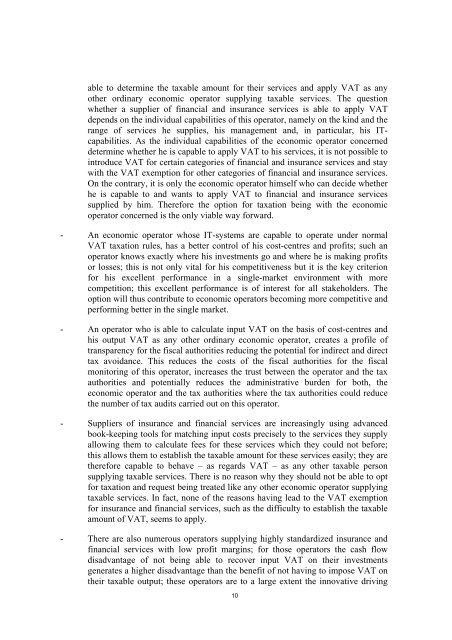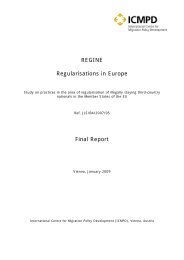taxud/2414/08 - European Commission - Europa
taxud/2414/08 - European Commission - Europa
taxud/2414/08 - European Commission - Europa
Create successful ePaper yourself
Turn your PDF publications into a flip-book with our unique Google optimized e-Paper software.
able to determine the taxable amount for their services and apply VAT as any<br />
other ordinary economic operator supplying taxable services. The question<br />
whether a supplier of financial and insurance services is able to apply VAT<br />
depends on the individual capabilities of this operator, namely on the kind and the<br />
range of services he supplies, his management and, in particular, his ITcapabilities.<br />
As the individual capabilities of the economic operator concerned<br />
determine whether he is capable to apply VAT to his services, it is not possible to<br />
introduce VAT for certain categories of financial and insurance services and stay<br />
with the VAT exemption for other categories of financial and insurance services.<br />
On the contrary, it is only the economic operator himself who can decide whether<br />
he is capable to and wants to apply VAT to financial and insurance services<br />
supplied by him. Therefore the option for taxation being with the economic<br />
operator concerned is the only viable way forward.<br />
- An economic operator whose IT-systems are capable to operate under normal<br />
VAT taxation rules, has a better control of his cost-centres and profits; such an<br />
operator knows exactly where his investments go and where he is making profits<br />
or losses; this is not only vital for his competitiveness but it is the key criterion<br />
for his excellent performance in a single-market environment with more<br />
competition; this excellent performance is of interest for all stakeholders. The<br />
option will thus contribute to economic operators becoming more competitive and<br />
performing better in the single market.<br />
- An operator who is able to calculate input VAT on the basis of cost-centres and<br />
his output VAT as any other ordinary economic operator, creates a profile of<br />
transparency for the fiscal authorities reducing the potential for indirect and direct<br />
tax avoidance. This reduces the costs of the fiscal authorities for the fiscal<br />
monitoring of this operator, increases the trust between the operator and the tax<br />
authorities and potentially reduces the administrative burden for both, the<br />
economic operator and the tax authorities where the tax authorities could reduce<br />
the number of tax audits carried out on this operator.<br />
- Suppliers of insurance and financial services are increasingly using advanced<br />
book-keeping tools for matching input costs precisely to the services they supply<br />
allowing them to calculate fees for these services which they could not before;<br />
this allows them to establish the taxable amount for these services easily; they are<br />
therefore capable to behave – as regards VAT – as any other taxable person<br />
supplying taxable services. There is no reason why they should not be able to opt<br />
for taxation and request being treated like any other economic operator supplying<br />
taxable services. In fact, none of the reasons having lead to the VAT exemption<br />
for insurance and financial services, such as the difficulty to establish the taxable<br />
amount of VAT, seems to apply.<br />
- There are also numerous operators supplying highly standardized insurance and<br />
financial services with low profit margins; for those operators the cash flow<br />
disadvantage of not being able to recover input VAT on their investments<br />
generates a higher disadvantage than the benefit of not having to impose VAT on<br />
their taxable output; these operators are to a large extent the innovative driving<br />
10
















